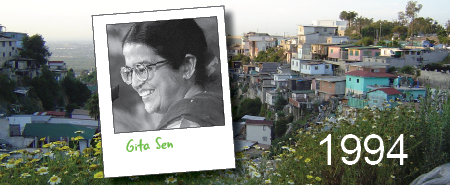 The Prize Jury’s Citation:
The Prize Jury’s Citation:
Dr. Sen’s outstanding contribution takes the rich body of scholarship on how patterns of resource exploitation are affected by household- and community-level partitioning of rights and ownership, and successfully connects it to crucial national and international policy debates on population growth, the status of women, and sustainable development.
The growing population on the earth has developed into a main environmental problem. Professor Sen combines a distinguished academic career with policy advocacy and NGO activism. She is a pioneer in the field gender and development. Her pioneering research has created a broader understanding of the manner in which the relationship between environment and development is conditioned by social structures and, in particular, by the changing role of women within them.
Sir Ratan Tata Chair Professor, Indian Institute of Management, Bangalore, India; Adjunct Lecturer at the Center for Population and Development Studies, Harvard University, USA. She was formerly Adjunct Lecturer at Harvard (1996-2002) and has been a Visiting Professor there and also at Vassar College, New York
Prof. Sen holds an M.A. in Economics from the University of Delhi and a Ph.D. in Economics from Stanford University, USA
The complete picture
Gita Sen is the scientist with a basis in economy who has investigated and in a new way given a much more complete picture of the large complex of population problems. With a multidisciplinary attack she has brought out the fundamental importance of the environment, sociological conditions, and most importantly the often disregarded and misunderstood role of women, the mother, in the poor communities where the birth rates are the highest.
Her work on women and the environment has underscored the tremendous role women in the developing world play in husbanding their ecological assets, in managing the biomass production, and in the protection and conservation of the environment. Professor Sen has also articulated important linkages between environment and macroeconomic policies, poverty, and livelihood generation among the disadvantaged.
Specifically, from the environmental perspective, Gita Sen’s contribution is to see people as part of the solution, not the problem. Gita Sen has pointed at the fact that people in the South do not trust the intentions of the North with regard to population and many poor women and men in the South do not trust their officials involved in family planning programs. Far better and more practical, it would seem according to Gita Sen, to create the social and developmental preconditions for people to need and want fewer children than to attempt to convince them against their own best judgment. Population policies must be voluntary and firmly grounded in the human rights of the individual and in particular the reproductive rights of women whose physical and emotional well being is most at stake.
Now:
Professor Sen is the current chairman of the Volvo Environment Prize Jury.
She is the author, co-author or co-editor of several books on these gender-related issues. She is a founding member of DAWN (Development Alternatives with Woman for a New Era); a network of Third World researchers, activists and policy-makers committed to alternative development and gender justice.
She is a trustee of Health Watch (Indi) and of the Institute of Social Studies Trust (India). She is on the Board of the UN Research Institute for Social Development (UNRISD) and on several other international organisations and advisory groups. Among many honours she received the Volvo Environment Prize in 1994, and an honorary doctorate from the University of East Anglia in the UK in 1998.
Politics and policy
Her academic and policy activism in this field has been an inspiration to a whole generation of researchers, policy-makers of South and North, and non-governmental activists. Her recent work includes reserach and policy advocacy on the gender implications of globalisation and economic liberalisation, the gender dimensions of population policies, and the links beteen population and the environment.
